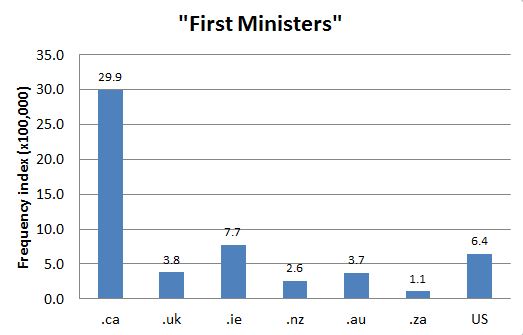DCHP-2
First Ministers first ministers DCHP-2 (October 2016)
n. — plural, Politics, Administration
the group consisting of the prime minister of Canada and the thirteen leaders of the provinces and territories.
Type: 5. Frequency — The collective term First Ministers refers to the current Prime Minister and the premiers of Canada's ten provinces (see the 1922 and 1983 quotations) and three territories. The term gained currency with the Victoria Charter of 1971, which called for "annual meetings to take place among the prime minister of Canada and the 'first ministers' of the provinces" (see Canadian Encyclopedia reference). Although the Victoria Charter was not adopted, the term First Ministers maintained currency. It is seen as useful for its ability to signify "top-level federal-provincial meetings", as well as to avoid controversy concerning titles for provincial leaders (e.g. premiers versus prime ministers) (see Canadian Encyclopedia reference).
First Ministers is often used in discussion of "First Ministers' Meetings" or "First Ministers' Conferences" (see Canadian Encyclopedia reference), events that are held to discuss national concerns such as health care or economic development (see the 2005 and 2007 quotations); these events account for much of the frequency of the term as seen in Chart 1.
See also Gage-5, s.v. "First Ministers", which is marked as "Cdn", and ITP Nelson, s.v. "first ministers", which is described as being used in Canada.See also: First Minister
References:
- Canadian Encyclopedia "First Ministers Conferences" Accessed 25 Mar. 2015
- Gage-5
- ITP Nelson
Images:
Chart 1: Internet Domain Search, 3 Jun. 2014
